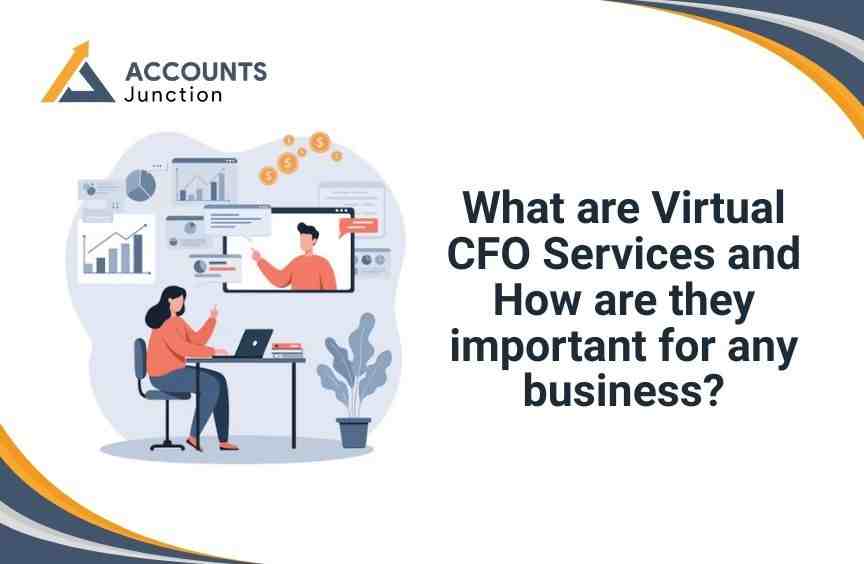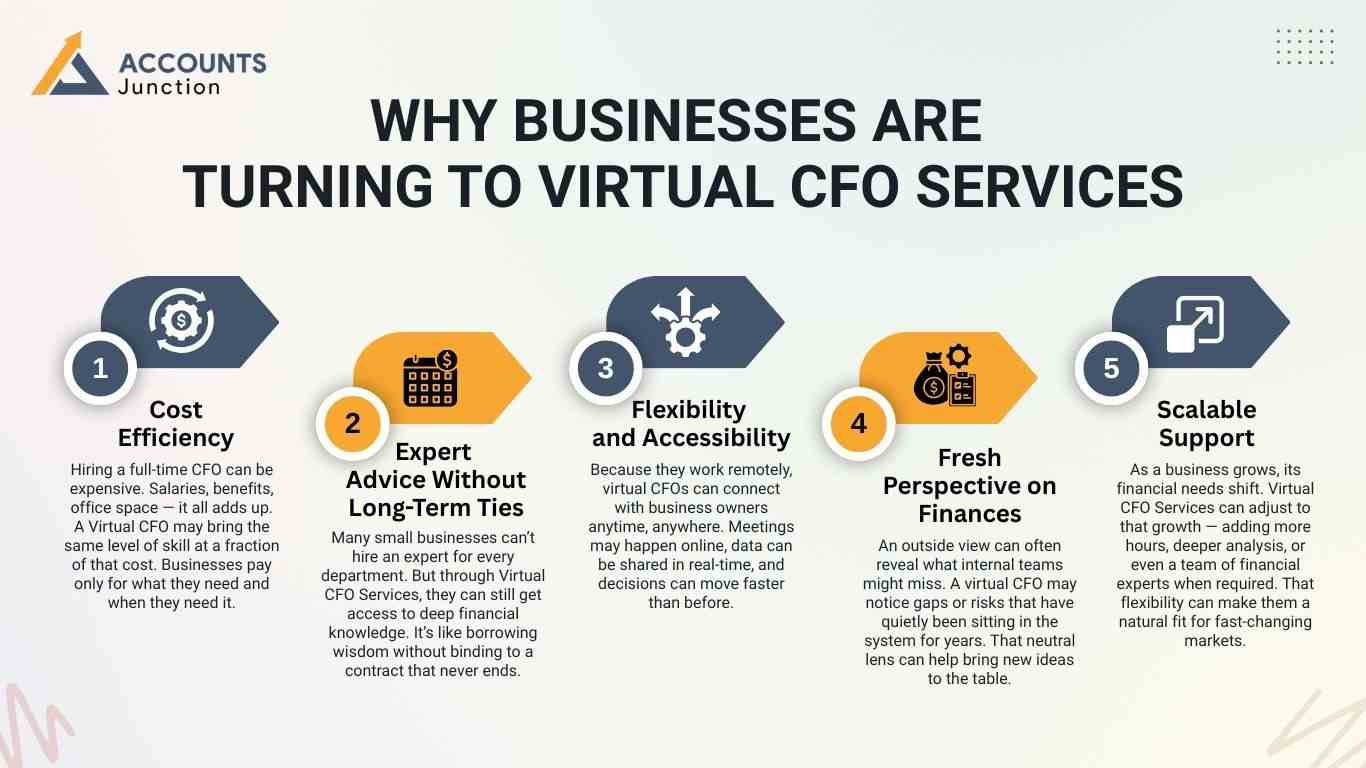
What are Virtual CFO Services and How are they important for any business?
When it comes to managing money in the business, numbers can sometimes puzzle your mind. At this point, a helping mind can make all the difference. Virtual CFO Services fits this situation — not as a hired hand sitting at your office desk, but as a remote financial guide who can see the full picture even from afar.
Many businesses today, big or small, have started leaning toward this new way of handling finance. It is like having a financial head without keeping one full-time on payroll. But before going deeper, let’s look at what these services actually are and why they might be turning heads across industries.
What are Virtual CFO Services?
A Virtual CFO (Chief Financial Officer) is a finance expert who works remotely to manage a company’s financial planning, reporting, and growth strategy. Instead of being physically present at your workplace, they use digital tools and cloud systems to handle everything — from budgets to forecasts.
These services may include many of the same roles a traditional CFO performs. The difference lies in how it is done — flexible, remote, and often more affordable. Businesses that do not yet need or cannot afford a full-time CFO can still enjoy the expertise of one.
Common Areas a Virtual CFO May Handle
- Financial Planning – They help build short and long-term goals and shape strategies to reach them.
- Budget Control – They might guide spending decisions and help track every outgoing cost.
- Cash Flow Management – Ensuring that money flows smoothly in and out may be one of their main focuses.
- Financial Reporting – They prepare clear reports that can show where your money stands at any given time.
- Forecasting and Risk Analysis – They can predict future outcomes and alert you to possible threats.
- Profit Strategy – Finding ways to improve revenue and cut waste can also be a large part of what they do.
Why Businesses Are Turning to Virtual CFO Services
In older times, only large corporations could afford CFOs. But today, even a small café or an online store can have one — virtually. Let’s see what makes virtual CFO services so appealing to modern businesses.
1. Cost Efficiency
- Hiring a full-time CFO can be expensive. Salaries, benefits, office space — it all adds up. A Virtual CFO may bring the same level of skill at a fraction of that cost. Businesses pay only for what they need and when they need it.
2. Expert Advice Without Long-Term Ties
- Many small businesses can’t hire an expert for every department. But through Virtual CFO Services, they can still get access to deep financial knowledge. It’s like borrowing wisdom without binding to a contract that never ends.
3. Flexibility and Accessibility
- Because they work remotely, virtual CFOs can connect with business owners anytime, anywhere. Meetings may happen online, data can be shared in real-time, and decisions can move faster than before.
4. Fresh Perspective on Finances
- An outside view can often reveal what internal teams might miss. A virtual CFO may notice gaps or risks that have quietly been sitting in the system for years. That neutral lens can help bring new ideas to the table.
5. Scalable Support
- As a business grows, its financial needs shift. Virtual CFO Services can adjust to that growth — adding more hours, deeper analysis, or even a team of financial experts when required. That flexibility can make them a natural fit for fast-changing markets.
How Virtual CFO Services Work
The process may look simple on paper, but it is a smart blend of technology and human skill. Let’s understand how these services often operate.
Step 1: Understanding the Business
The first step is learning what the business stands for — its size, goals, and pain points. A good Virtual CFO listens more than they speak in the beginning. They study the numbers but also the story behind those numbers.
Step 2: Setting Financial Goals
Once they understand your world, they can start shaping clear goals. These might involve reducing debt, managing costs, or planning for growth. Every plan is unique because every business runs differently.
Step 3: Building the Framework
Budgets, cash flow plans, and reporting systems come next. The Virtual CFO sets up dashboards and tools so that data can be tracked smoothly and viewed anytime.
Step 4: Monitoring and Adjusting
Finances never stay still. Markets shift, and so do plans. Virtual CFOs may monitor reports each month, adjust budgets, and alert owners about red flags before they grow into larger issues.
Step 5: Strategy and Growth Support
When business owners need to make major decisions — like entering new markets, buying assets, or scaling — the Virtual CFO can guide them through data-driven insight.
Benefits of Using Virtual CFO Services
Now that we know how it works, let’s explore what real benefits a business might notice after hiring a virtual CFO.
1. Better Financial Clarity
Numbers may look messy when scattered across spreadsheets. A virtual CFO can organize those figures into clean reports that show what truly matters. With clearer data, decisions can become sharper.
2. Risk Reduction
Every business faces risks — market dips, cash shortages, unpaid bills. A virtual CFO might spot these early and suggest backup plans. Prevention often costs less than fixing.
3. Improved Decision-Making
With solid reports and forecasts, business owners can see outcomes more clearly. Choices may not always be easy, but they can at least be informed.
4. Time Savings
When finance duties shift to a professional, business owners can finally focus on what they love — running their business, building products, and serving customers.
5. Access to Tools and Tech
Most Virtual CFOs use cloud-based tools for tracking finances. This can give business owners live access to reports from anywhere. It also saves time and reduces human error.
6. Smooth Scaling
As businesses grow, so does financial complexity. Virtual CFOs can expand their service as needed — from basic bookkeeping to full-scale strategic planning.

The Role of Technology in Virtual CFO Services
It is hard to imagine Virtual CFO Services without modern tech. Cloud accounting platforms, data dashboards, and AI-powered forecasting tools are often the silent partners behind their success.
Tools like QuickBooks, Xero, and NetSuite help virtual CFOs maintain real-time financial visibility. Automation can also save hours that would otherwise be lost in manual entry. Data analytics may further help them see trends and patterns that human eyes might skip.
So while it may feel like the CFO works alone, the truth is — technology quietly sits beside them, powering each move they make.
When a Business Might Need Virtual CFO Services
Not every company needs a virtual CFO right away. But certain signs can suggest the time is near. Here are a few clues that may point toward that need:
- Financial confusion grows each month.
- Cash flow feels unpredictable.
- Budgets often go off track.
- Taxes and compliance feel messy.
- There’s no clear growth plan.
When those signs appear, it may be time to bring a virtual CFO onboard — someone who can bring structure to the numbers and peace to the mind.
Virtual CFO vs Traditional CFO
A traditional CFO sits inside your office, working as a full-time executive. A virtual CFO stays outside the office but brings equal expertise. The key difference lies in the flexibility, cost, and mode of work.
|
Feature |
Virtual CFO |
Traditional CFO |
|
Location |
Remote |
On-site |
|
Cost |
Pay per need |
Full-time salary |
|
Flexibility |
High |
Limited |
|
Technology Use |
Strong |
Moderate |
|
Ideal For |
Small to mid-size firms |
Large corporations |
For many small and mid-sized companies, Virtual CFO Services may offer the best balance between cost and quality.
Challenges in Using Virtual CFO Services
Every good thing comes with a few hurdles. Virtual CFOs, too, may face challenges like:
- Communication gaps due to remote work.
- Data security concerns.
- Time zone differences when working with global teams.
But most of these issues can be solved with strong digital systems, regular meetings, and reliable security tools. At Accounts Junction, we offer complete flexibility and our services function 24/7 leaving no challenge for time zones.
Future of Virtual CFO Services
The future seems bright for this model. As businesses go digital, the demand for remote financial leadership may continue to grow. Technology will likely make these services even more efficient — blending human insight with machine accuracy.
In the coming years, virtual CFOs may become the norm rather than the exception. They can help even small ventures think and plan like large corporations — smartly, safely, and strategically.
Money alone doesn’t build a business; management does. And managing money the right way often decides whether a business grows or fades. Virtual CFO Services may serve as the bridge — offering expertise without the full-time cost.
For a small business owner doing many roles, this may be the correct decision. A helping hand for managing finances as an expert is a significant advantage for any business. If you want to hire a virtual CFO for your business, contact Accounts Junction now! We offer flexible virtual CFO services that suit your business.
FAQs
1. What exactly are Virtual CFO Services?
- They are remote financial management services that act like a full-time CFO but work online and part-time.
2. Who should use Virtual CFO Services?
- Any small or mid-size business that wants expert financial advice without hiring a full-time CFO.
3. Can Virtual CFOs work with startups?
- Yes, they often help startups with fundraising, budgeting, and building financial structures.
4. How do Virtual CFOs communicate with clients?
- Mostly through video calls, emails, and cloud-based dashboards.
5. Do Virtual CFO Services include bookkeeping?
- Yes. At Accounts Junction we offer bookkeeping along with financial strategy and oversight.
6. Are Virtual CFO Services affordable?
- They are usually more cost-effective than hiring a full-time CFO.
7. What tools do Virtual CFOs use?
- At Accounts Junction, we use software like QuickBooks, Xero, or NetSuite for reports and forecasting.
8. Can Virtual CFOs help in tax planning?
- Yes, we offer guidance on tax strategies and compliance.
9. How secure is financial data with Virtual CFOs?
- Our virtual CFO services use encrypted systems to keep data safe.
10. Do Virtual CFOs replace accountants?
- No, they work alongside accountants to manage broader financial goals.
11. Can virtual CFOs help in fundraising or investor talks?
- Yes, Virtual CFOs can prepare financial models and reports for investors.
12. How long do businesses hire Virtual CFOs for?
- It can range from a few months to several years depending on the company’s needs.
13. Is virtual CFO service suitable for non-profits?
- Yes, non-profits can use them to manage grants, budgets, and compliance.
14. How does a business choose the right Virtual CFO?
- By checking their experience, reviews, and understanding of the industry.
15. Do they help in business expansion plans?
- They can create forecasts and strategies for entering new markets.
16. Can a virtual CFO manage cash flow problems?
- Yes, a virtual CFO can help you monitor inflows and outflows to maintain stability.
17. Do virtual CFOs prepare monthly financial reports?
- At Accounts Junction, our CFOs share monthly or quarterly performance reports.
18. Can Virtual CFO Services improve profitability?
- Yes, through better cost control and strategic planning.
19. Are Virtual CFOs available across countries?
- Yes, our virtual CFO services are globally available for business of all types.
20. What makes Virtual CFO Services unique?
- Their flexibility, affordability, and expert insight delivered remotely.
